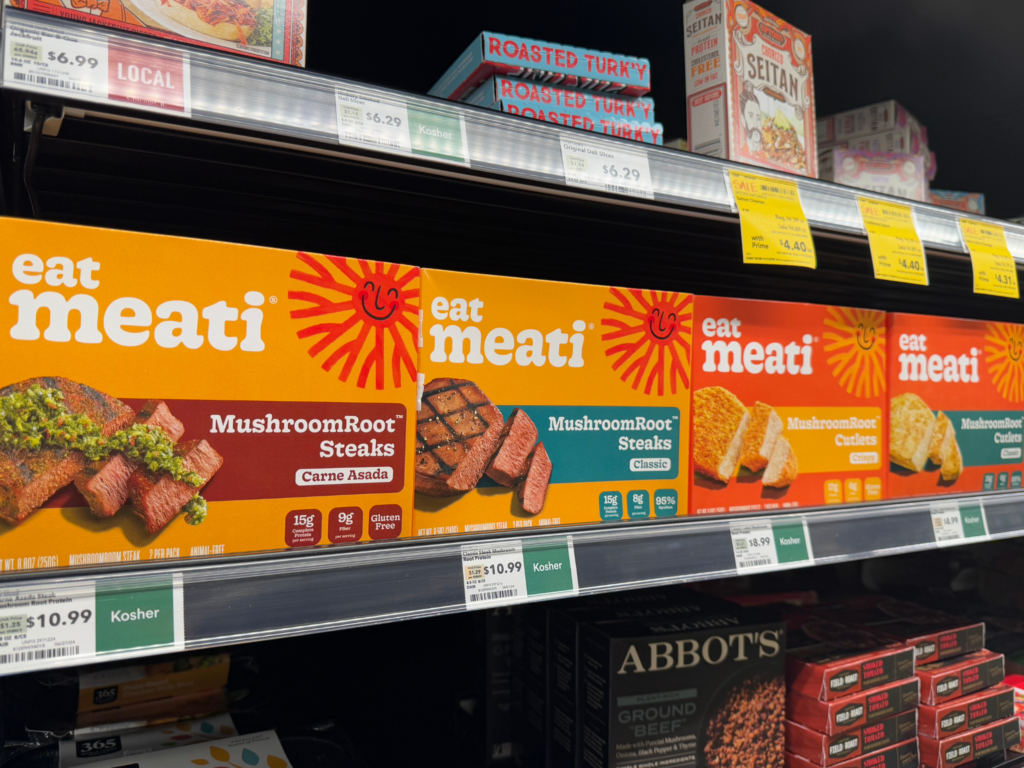Cautious, Excited: US Future Food Leaders React to RFK Jr Confirmation as Health Secretary
8 Mins Read
With Robert F Kennedy Jr becoming the new Health and Human Services Secretary, alternative protein leaders exhibit optimism, as well as caution.
Stakeholders in the alternative protein ecosystem are largely optimistic about the confirmation of Robert F Kennedy Jr as the new US health secretary, at least on the surface.
The former environmentalist has been given free rein of the American food and health system by President Donald Trump, and has pledged to clamp down on genetically modified (GMO) and ultra-processed foods (UPFs), categories directly associated with sustainable proteins like plant-based meat or precision-fermented eggs.
Other novel foods like cultivated meat face a threat too. The category is already weathering a storm of legislative measures trying to ban these proteins in over 20 states. There are suggestions that RFK Jr won’t push forward for a nationwide ban – though his appointment could make the regulatory pathway for these foods much more complicated, with multiple sources telling Green Queen they believe the sector will be dormant for the next four years.
Still, alternative protein leaders say they have promised to work with RFK Jr to drive their industry forward and welcome many of his policy positions on the food system.
“While I won’t agree with every policy, I believe RFK Jr will push for much-needed reforms in our food system. It’s broken and overdue for an overhaul, and I see him taking steps in the right direction,” says Robert Dupree, general partner at VC firm Alwyn Capital.

Arturo Elizondo, co-founder and CEO of animal-free egg maker The Every Company, welcomes the government’s “commitment to improve the health of Americans through RFK’s confirmation and the new Executive Order establishing the Make America Healthy Again Commission”.
“With over 88,000 employees and the largest department in the federal government by budget, we are optimistic that the escalating health crisis can be routed,” he says.
In an exclusive op-ed for Green Queen, Daily Harvest CEO Ricky Silver wrote: “While RFK and the MAHA movement gained momentum by joining forces with President Trump and his campaign, I’m sceptical that the new administration – which governs and recently campaigned on massive deregulation, climate change scepticism, and a cosiness to billionaires and massive corporate interests – will remain committed to the movement and act accordingly.”
How will the UPF debate fare for plant-based meat?
UPFs have been one of RFK’s most heavily criticised categories, having vowed to remove them from school lunches. Plant-based meat has been caught in the crossfire, subjected to biased criticism amid misguided connections of processing with nutrition.
Food awareness organisation ProVeg International believes any new US health secretary presents a chance to promote healthy and sustainable diets, citing RFK Jr’s statement at his confirmation hearing: “Our country will sink beneath a sea of desperation and debt if we don’t change course and ask: ‘Why are healthcare costs so high in the first place?’ The obvious answer is chronic disease.”
Josh Bisig, senior policy research manager at ProVeg, agrees. At the same time, he notes that in the past, RFK Jr has “over-emphasised” the role of UPFs in chronic disease, while “ignoring the importance” of cutting back on meat and eating more plants. “We hope RFK Jr will see the importance of plant-based diets in enhancing the health of US citizens,” he says.

“He has framed [UPFs] as a root cause of modern health crises and is pushing for stricter controls, including labelling and ingredient bans,” Chiara Cecchini, business development director at Bill Gates-backed company Savor, wrote in an opinion piece for Green Queen. “If his vision shapes future food policy, synbio companies have the opportunity to prove their products belong in a different category – one that delivers both undeniable health and sustainability benefits.”
One company leader is embracing the scrutiny on UPFs and “misleading health claims in the plant-based space”. Phil Graves, CEO of mycelium meat maker Meati, says: “Consumers are demanding real, whole-food nutrition, and we see this as an opportunity to differentiate Meati from both factory-farmed meat and ultra-processed plant-based alternatives.”
He sees it as an opportunity for his products – which he describes as “functional, whole-food protein with prebiotic fibres that support gut health” – to help “change the protein paradigm”.
However, he adds: “Consumer scepticism towards plant-based foods could impact the entire category. It’s on brands like Meati to lead with transparency and science-backed benefits to gain trust.”
AI vs agriculture makes biomanufacturing more critical
Jessica Almy is the senior VP of policy and government relations at the Good Food Institute, an alternative protein think tank. She believes the US now has a “unique opportunity” to lead the world in agricultural innovation and “build the bioeconomy of the future”.
“We remain committed to engaging with the administration on policies that strengthen food safety, safeguard public health, and empower consumers with more food choices,” she says.
Elizondo, whose company received a $2M biomanufacturing grant under the Biden administration, points out that Trump has “always been an advocate for biotechnology and advanced bioindustrial manufacturing”. He says: “We’re hopeful what was true during the first administration and allowed us to move confidently forward in obtaining regulatory approval for our products remains true in this second administration as we look to build our first biomanufacturing facility here in the US.”

For investment firms like Alwyn Capital, RFK Jr being health secretary doesn’t change their strategy. Dupree says the growth of artificial intelligence (AI) and subsequent energy demand has ushered in a new arms race, with both the US and China racing to secure stable power and water supply.
“Water, alongside food, can become a strategic weapon. In drought-prone US states, scarce water supplies will pit agricultural interests against AI development,” he explains.
Most water from the Colorado River is currently used for agriculture, particularly for animal feed. “Data centres and their energy sources will directly compete with agriculture for this vital water supply. Adding to the tension, states with the highest farm revenue are also offering tax incentives to attract new data centres,” Dupree says.
He continues: “A conflict is brewing between AI development and animal agriculture. If we believe AI is key to maintaining global leadership, we must prioritise resources for that industry. But how can we achieve this while continuing to feed our nation’s citizens? The answer is biotechnology.”
A blow for factory farming
RFK Jr’s turn as health secretary could spell trouble for factory farms. He has spoken of his wish to “reverse 80 years of farm policy and end our reliance on industrial meat production, factory farming, and chemical-based agriculture”.
“He seems to be aware of how industrialised systems of animal farming wreak havoc on the environment and our health,” says Josh Tetrick, co-founder and CEO of Eat Just, the company behind plant-based egg maker Just Egg and cultivated meat pioneer Good Meat.
“He’s talked about antibiotic usage. He’s talked about how when you need to pack animals in tiny spaces, you need to vaccinate the heck out of them, and how it’s indicative of a broken system – and I think all those things he’s right on. I couldn’t agree with him more on all that,” Tetrick outlines.
His company’s recent success is an example of the ills of animal agriculture. Sales of his mung-bean-based Just Egg grew five times faster this January than 12 months prior, as retailers and restaurants ramp up their demand for the product amid the national egg crisis.

“This creates an opportunity for technologies that can bring back egg supply quickly,” notes Dupree. “By building redundancies in the food supply with alternative proteins, we position ourselves for strong market opportunities.”
Tetrick hopes RFK Jr’s run as the health secretary “really focuses on moving us away from these large industrial systems” where you need to over-vaccinate animals and put antibiotics in their food. “I think those are all things that he’s looking at really clearly, and it’s very evidence-based,” he says. “Anything that we can do to support him in that, we’ll stand by and work with him to do so.”
The risks and opportunities of RFK Jr’s confirmation
Meati is looking to capitalise on the UPF backlash and emphasise “functional, clean-label nutrition”, as Graves puts it. “While some plant-based brands rely on isolates, artificial additives, and complex processing, Meati is made from a single, minimally processed whole-food ingredient – mycelium,” he says.
“We’re doubling down on educating consumers about why food processing matters just as much as ingredients,” Graves adds.
With the US plant-based market set to triple by 2023, ProVeg’s Bisig expects the new HHS secretary to support policies that will further accelerate this growth. “We were encouraged to hear incoming RFK Jr’s promise in his confirmation hearings that his ‘approach to administration at HHS will be radical transparency’ and that he wants ‘to make sure that science is unobstructed by vested economic interests’,” he says.
“In this spirit, he should guide HHS to develop the dietary guidelines to reflect the committee’s recommendations in their scientific report to increase plant sources of protein, and to prioritise plant sources of protein above animal sources.”

For The Every Company’s Elizondo, RFK Jr’s charge of HHS could increase demand for its chicken-free egg proteins, which “help eliminate the use of gums, fats, oils, salt and other harmful or non-clean label ingredients in line with the objectives of this administration’s attack on chronic disease”.
Under Trump, though, there’s also a big risk in “any retaliatory tariffs which might affect our supply chain”, he says. “But we’ve planned ahead by building redundancy.”
Dupree, meanwhile, feels time is of the essence. “The greatest challenge is aligning urgency with action. Educating people and driving real implementation is slow, but the need for change is undeniable,” he says. “Regardless of RFK Jr’s views on precision fermentation, plant-based proteins, or cultivated meat, these technologies will be essential and strategically advantageous for the US.”



